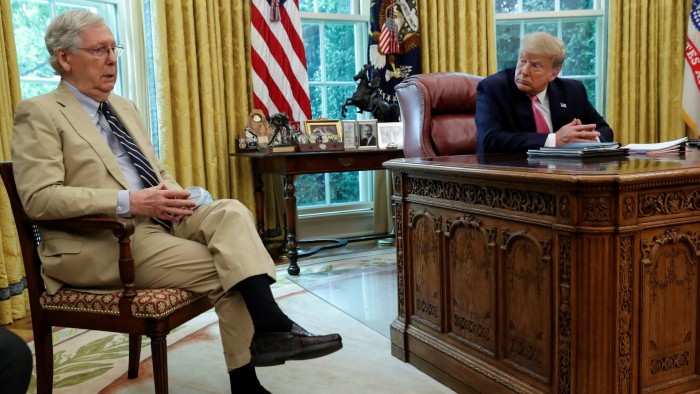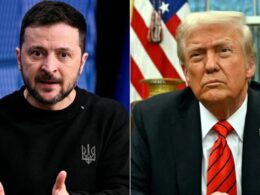Mitch McConnell is nobody’s idea of a principled heir to his onetime Republican colleague John McCain, who spent his waning days in the Senate fighting a lonely battle against the excesses of Donald Trump’s first presidency — especially on the international stage.
But earlier this week, McConnell published a 4,700 word treatise in Foreign Affairs magazine, bible of Washington’s national security establishment, that was nothing less than a clarion call for the Reaganite wing of the Republican party. He gave voice to those within the party wanting to challenge the neo-isolationist world view that Trump and his Maga acolytes have been advocating. To quote the most relevant passage:
Even though the competition with China and Russia is a global challenge, Trump will no doubt hear from some that he should prioritize a single theater and downgrade US interests and commitments elsewhere. Most of these voices will argue for focusing on Asia at the expense of interests in Europe or the Middle East. Such thinking is commonplace among both isolationist conservatives who indulge the fantasy of “Fortress America” and progressive liberals who mistake internationalism for an end in itself. The right has retrenched in the face of Russian aggression in Europe, while the left has demonstrated a chronic allergy to deterring Iran and supporting Israel. Neither camp has committed to maintaining the military superiority or sustaining the alliances needed to contest revisionist powers. If the United States continues to retreat, its enemies will be only too happy to fill the void.
McConnell, 82, will soon give up his position as Republican leader in the Senate, and his age and signs of failing health make it unlikely he will emerge as a McCain-like truth teller on foreign policy during the second Trump presidency. But the one thing at which McConnell is preternaturally skilled is reading the political tea leaves. That is why the Foreign Affairs piece — though making barely a ripple beyond the Beltway — caused many in Washington officialdom to take notice. Is it possible McConnell knows something we don’t?
The initial signs that Republican internationalists might step up their resistance to the isolationists heading to the White House have not been promising. Pete Hegseth, the embattled defence secretary nominee, has struggled to win over some within the Senate’s Republican caucus. But almost all of the opposition has focused on revelations about Hegseth’s personal life rather than his troubling views on military readiness.
None of the onetime “national security Republicans” seems to object to Hegseth’s views about the military itself, which he has spelled out in great detail in his several books, most recently 2024’s The War on Warriors. What his writings make clear is that Hegseth is most concerned about fighting “wokeness” within the uniformed services, arguing the US military is suffering from an “infection of radical left-wing social justice policies”.
Even those Republicans inclined to agree with Hegseth’s narrative should be disturbed by the prospect of an ideological purge at the Pentagon — the last thing American forces need amid hot wars in Europe and the Middle East, and the prospect of an even more consequential conflagration in East Asia.
And yet those who might be expected to speak up are not. Lindsey Graham, the South Carolina Republican who was once McCain’s partner in asserting American internationalism, reportedly fought a rear-guard action in an attempt to prevent Trump from picking his vice-presidential nominee JD Vance, who is an outspoken advocate of dropping support for Ukraine and other neo-isolationist policies. But on Hegseth, Graham has fallen into line. Others who could be categorised as Reaganite Republicans on national security — Texan John Cornyn, who has been an outspoken advocate for Ukraine, and Jim Risch, chair of the Senate’s foreign affairs committee — have said they will back Hegseth.
Which brings us back to McConnell. In a long, in-depth interview with my colleague Alex Rogers recently, McConnell refused to be drawn on Hegseth or Tulsi Gabbard, the nominee for national intelligence director who has backed the Kremlin in ways so extreme that some have speculated she is a Russian mole. Indeed, when Alex pressed him on the nominations, McConnell reverted to his characteristically prickly self: “How many times do we have to say the same thing over and over again? You’re wasting your time and mine too.”
If McConnell were to come out against Hegseth and Gabbard, it would create space for other national security Republicans to put their heads above the parapet. Given the bravado of the Trumpians this week, it’s easy to forget that second-term presidents inevitably see their political capital dissipate from the moment they are sworn in. They are, after all, lame ducks from that very moment in time.
Rana, my question for you is whether I am giving McConnell too much credit, and whether the power of his example would really have any effect on the Republican caucus. In some ways, we’ve been here before. McConnell was publicly outraged at Trump’s behaviour during the January 6 riots four years ago, but then famously failed to take the next logical step of voting for his impeachment. McConnell could again fail to act on his principles.
A quick programming note: Swamp Notes is taking a short break. We’ll be back in your inbox in early January. Happy holidays!
Recommended reading
-
Trump’s neo-isolationist instincts will be tested in Syria, where he has already warned Joe Biden: “DO NOT GET INVOLVED”. Having spent time as a war correspondent in Iraq after the fall of Saddam Hussein, I have my own concerns about the limits of American influence in the region. But the New Yorker has a timely interview with Robert Ford, a former US ambassador to Syria, who argues Washington does have a role and should be engaged diplomatically — including with the Islamists who have taken power in Damascus.
-
If you read one thing this week on the war in Ukraine, I highly recommend this piece by my FT colleagues Max Seddon and Christopher Miller on the SBU, Ukraine’s intelligence agency that pulled off the assassination of a Russian general in Moscow. It’s filled with amazing details that are straight out of a James Bond flick.
-
Few stories generated more reader input than the spate of violence last month in Amsterdam, when Israeli fans were attacked after a football match, with much finger-pointing over who bore responsibility. The Washington Post has done an excellent job piecing together the evening’s events through use of publicly available videos posted by eyewitnesses. Their findings? As expected, it’s far more complicated than it seemed at first blush.
Rana Foroohar responds
Peter, you are blending a lot of disparate issues here, but let me address what I think is the most important question — is McConnell trying to set an example of some kind with his piece in Foreign Affairs? While I don’t expect him to come out against Hegseth or Gabbard, I do think he’s trying to raise the alarm bells about something much more important, which is America’s inability to police the world because we no longer have either the political will or the capacity to do so. The key phrase from the piece is this: “Neither camp has committed to maintaining the military superiority or sustaining the alliances needed to contest revisionist powers. If the United States continues to retreat, its enemies will be only too happy to fill the void.”
Earlier this week I looked at the ways in which there could be overlap between right and left on the desperate need to increase naval power. Since the piece came out, the incoming national security adviser Mike Waltz had to pull his name off the co-sponsored bill to increase ship-building capacity, since he’s leaving for the new administration. But I know he’s still quite supportive. Many security analysts (and plenty of people on Wall Street) believe maritime capacity is one of the main areas in which we may well see increased US spending, and partnerships with allies.
What I find interesting is that McConnell seems to be advocating for increased military capacity (and he’d be right to do so). But he’s forgetting that in areas such as maritime capacity, it was Reagan who actually screwed things up by disconnecting the military industrial complex from the commercial sector (see my column for details on why that matters). That’s the thing that Asian nations have gotten so very right — you can’t have national security without economic security (this is true whether you are talking about chips, or ships). So, basically, I don’t think McConnell’s advice will amount to much, because he can’t even provide intellectual clarity on the chicken and egg situation here. And this is one of the reasons why we have Trump ‚ because the policy prescriptions of the Reaganite wing of the Republican party simply aren’t purpose built for the post-neoliberal era.
Your feedback
And now a word from our Swampians . . .
In response to “What death of UnitedHealthcare’s CEO tells us about America”:
“One thing that Corporate America has gotten wrong is the goal of profit maximisation by all means available, ethical or otherwise. Ethical profit maximisation can be done in many ways, just avoid negatively impacting your key stakeholders: customers, suppliers and your community. The insurance industry has a lot to gain in internal productivity, just by replacing faxes with alternative processing means for example. No need to deny coverage as a means of maximising profits. Moreover, the AI revolution has a lot to offer the insurance industry in expediting claims processing while reducing fraud at the same time. It is a pity insurance companies are looking for profits in the wrong place.” — Alfredo Rodriguez
Your feedback
We’d love to hear from you. You can email the team on swampnotes@ft.com, contact Peter on peter.spiegel@ft.com and Rana on rana.foroohar@ft.com, and follow them on X at @RanaForoohar and @SpiegelPeter We may feature an excerpt of your response in the next newsletter
Source link









